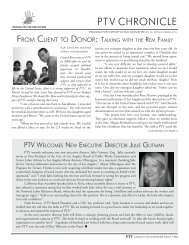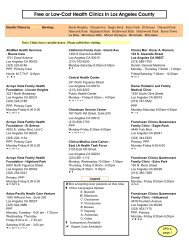Interview with Dr. Jose Quiroga, Page 19 - Program for Torture Victims
Interview with Dr. Jose Quiroga, Page 19 - Program for Torture Victims
Interview with Dr. Jose Quiroga, Page 19 - Program for Torture Victims
Create successful ePaper yourself
Turn your PDF publications into a flip-book with our unique Google optimized e-Paper software.
HEALTH<br />
The Neuroscience of Education<br />
Recent work in neuroscience and<br />
learning suggests that the most effective<br />
adult educators may be unwitting<br />
neuroscientists, who use interpersonal<br />
skills to enhance brain development in<br />
a positive learning environment. This<br />
was the message given at a STARTTS<br />
seminar by LOUIS COZOLINO, a<br />
professor of psychology at the Pepperdine<br />
University, Cali<strong>for</strong>nia, and author<br />
of The Neuroscience of Education.<br />
<strong>Interview</strong> by Mariano Coello & Max Schneider<br />
You mentioned the brain is a<br />
social organism. What do you<br />
mean by that?<br />
For years the brain was perceived<br />
as a relatively static organ, determined<br />
by a combination of genetic<br />
programming and early<br />
childhood experience. However,<br />
recent theories and technological<br />
advances in brain imaging have<br />
revealed that the brain is an organ<br />
continually built and rebuilt by<br />
one’s experiences.<br />
We are now beginning to learn<br />
that many <strong>for</strong>ms of psychotherapy<br />
developed in the absence of any<br />
scientific understanding of the<br />
brain are supported by neuroscience<br />
findings. It could be argued<br />
that to be an effective psychotherapist<br />
these days it is essential<br />
to have some basic understanding<br />
of neuroscience.<br />
We tend to think the brain is like<br />
any other organ, but the brain<br />
connects <strong>with</strong> other brains so the<br />
fact that the brain is a social organ<br />
gives us an understanding of why<br />
we are all connected, so that when<br />
people feel something we feel<br />
it too. And that happens by the<br />
brain creating an internal model<br />
of the experience of the other.<br />
The brain evolved to be connected<br />
<strong>with</strong>, be regulated by, and learn<br />
from other brains. Our brains are<br />
more like the ants in a colony<br />
than autonomously functioning<br />
structures.<br />
I think the brain is so complicated,<br />
and its functioning in so many<br />
ways is so mysterious, that we are<br />
still just at the very beginning. But<br />
of course the more technologically<br />
advanced we get and the more<br />
windows we have to the brain, the<br />
more we can understand what is<br />
going on in there.<br />
You have written about education,<br />
why is education so important<br />
<strong>for</strong> personal development?<br />
Education is life. The brain is designed<br />
to keep learning. We need<br />
to be stimulated. Education does<br />
not need to be in a classroom.<br />
Education is a state of mind where<br />
you are open to exploration. If you<br />
look at animal research, exploratory<br />
behaviour is a measure of the<br />
absence of anxiety and fear.<br />
So in a sense if you are out there<br />
learning and exploring you are<br />
growing your brain. You are active,<br />
PHOTO: MICHAEL PHILLIPS<br />
36<br />
REFUGEE TRANSITIONS • ISSUE 26 37




